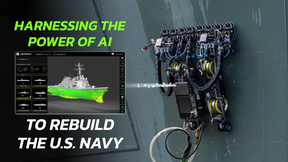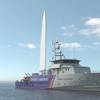President Bush nominated Adm. Michael Mullen to serve as the next Chairman of the Joint Chiefs of Staff, and Marine Corps Gen. James E. “Hoss” Cartwright as his Vice Chairman on June 28.
Speaking in the White House Roosevelt Room, Bush called Mullen and Cartwright “experienced military officers who are highly qualified for these important positions.”
Mullen currently serves as Chief of Naval Operations, and Cartwright serves as Commander, U.S. Strategic Command. If confirmed by the Senate, they will succeed Marine Gen. Peter Pace, chairman of the Joint Chiefs of Staff, and Navy Adm. Edmund P. Giambastiani, vice chairman.
Bush noted that Mullen’s and Cartwright’s nominations come at a critical time for the United States.
“America is at war, and we are at war with brutal enemies who have attacked our nation and who would pursue nuclear weapons and would use their control of oil as economic blackmail and intend to launch new attacks on our country,” he said. “At such times, one of the most important decisions a president makes is the appointment of the chairman of the Joint Chiefs of Staff.”
As the country’s highest-ranking military officer, the chairman serves as the principal military adviser to the president, the defense secretary, the National Security Council and the Homeland Security Council, Bush noted. He also is responsible for ensuring the readiness of U.S. military forces.
Bush called Mullen uniquely qualified to take on this job. A 1969 graduate of the U.S. Naval Academy, Mullen went on to pursue an “illustrious military career” during which he received an advanced degree from the Naval Postgraduate School and commanded three ships, a cruiser destroyer group and an aircraft carrier battle group, he noted.
Mullen also served as commander of NATO’s Joint Forces Command in Naples, Italy, with responsibility for alliance missions in the Balkans, Iraq and Mediterranean, and as commander U.S. Naval Forces Europe.
At the Pentagon, Mullen served as the Navy’s Director of Surface Warfare; Deputy Chief of Naval Operations for Resources, Requirements and Assessments; Vice Chief of Naval Operations and, since July 2005, as Chief of Naval Operations.
“Mike is a man of experience, of vision and high integrity,” the president said. “He is the right man to lead America’s armed forces.”
Bush extended similar praise to Cartwright, noting his broad educational and military experience.
Cartwright graduated from the University of Iowa, earned his advanced degree from the Naval War College and completed a fellowship at the Massachusetts Institute of Technology, the president noted.
A Marine aviator, Cartwright has commanded deployed Marines at all levels. He also has broad experience on the Joint Staff, where he served twice as the director of force structure, resources and assessment before taking the reins as head of the U.S. Strategic Command in 2004, he said.
At STRATCOM, Cartwright has been responsible for America’s nuclear arsenal; missile defenses; space operations; information operations; global command and control; intelligence, surveillance and reconnaissance; and efforts to combat weapons of mass destruction, Bush said.
He has met these responsibilities “with honor, skill and integrity,” the president said, noting that he will apply these same principles in his position as vice chairman of the Joint Chiefs.
Mullen said he is honored to be nominated to the chairman’s position to lead the U.S. military at an important time in its history.
“Clearly, we remain a nation at war against formidable enemies,” he said. “The way forward in Iraq and Afghanistan -- the path we take now and in the future --will shape the character of the longer, larger struggle against terror.”
Mullen emphasized that success depends on more than just military might.
“It cannot be a military path alone. That much is clear,” he said. “We must continue to focus on the broad range of America's defense and security commitments around the world and on the many instruments of national power needed to safeguard those commitments.”
He noted changes in the world and their effect on U.S. security arrangements.
Featured videos

U.S. Dredging’s Bull Run Should Continue Under Trump Administration

Harnessing the Power of AI to Rebuild the U.S. Navy

Commercial Maritime’s Sail Solution, with French Flair
Subscribe for
Maritime Reporter E-News
Maritime Reporter E-News is the maritime industry's largest circulation and most authoritative ENews Service, delivered to your Email five times per week










